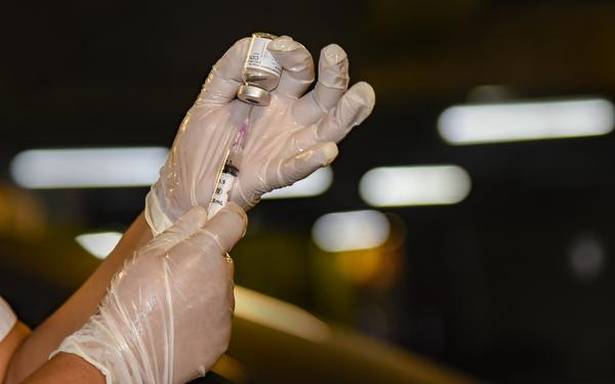‘Allow States to prioritize areas, ages for vaccination in their jurisdiction’
India’s vaccination bill can be minimised by following a fully centralised procurement model that would reduce prices rather than States pursuing purchases on their own, EY India said in a report on Thursday, calling for an urgent recast of the ‘current ad hoc and non-transparent vaccination distribution strategy’.
If the country maintained the vaccination rate of 2.31 million doses per day recorded over March and April, with the current interstate distribution pattern, it would result into a hopeless situation, the report noted, adding that the pace of vaccinations had already fallen further in May.
“At an all-India level, it would require 748 days to achieve full coverage of the population of 18 years and above (eligible population). But, in terms of coverage of individual states, some States would require far too many days. For example, Uttar Pradesh may require 1,553 days, while Bihar may require 1,351 days and Tamil Nadu may require 1,217 days,” the report said.
Stressing that the Centre has a primary role in ensuring country-wide vaccine coverage, the report authored by EY India’s chief policy advisor D.K. Srivastava, who was also a member of the Advisory Council to the 15th Finance Commission, said that the ₹35,000 crore provided in the Union Budget for vaccination is meant to be transferred to the States.
“If Centre becomes the only governmental agency to procure vaccines, the average price per vaccine would be much lower than if individual states get involved in floating global tenders. For vaccinating India’s total population aged 12 years and above at 108.5 crore, total required doses would be 217 crore considering two doses per person,” the report explained, adding that a single purchase agency would be able to reap economies of scale and have more bargaining power.
“At an average price of ₹300 per dose, the total vaccination cost would be ₹65,108 crore. If States’ involvement pushes up the average price to say ₹500 per dose, total vaccination bill to the country would unnecessarily go up to ₹1.09 lakh crore. This cost enhancement, which may be higher if the average vaccine price increases even more, is clearly avertible apart from avoiding the confusion ensuing from states’ involvement in vaccine procurement and implementation,” Mr. Srivastava pointed out.
Vaccination and extended lockdowns are the only two policy instruments available to control the pandemic, and vaccination would be critical to help minimise the economic costs of lockdowns, which are progressively getting extended in terms of duration and in terms of coverage of geographical area, he said.
“There is clearly a trade-off between the duration and spread of the lockdowns on the one hand and the erosion of growth on the other. The more extensive the lockdowns, the larger would be the loss in GDP growth,” Mr Srivastava said, adding that the government’s non-tax revenue and non-debt receipt estimates for the year hinge heavily on asset monetisation and divestment plans that look ‘extremely difficult to achieve’.
Estimating a shortfall of ₹2.3 lakh in the Centre’s revenues overall, Mr. Srivastava said the fiscal deficit may slip to 7.9% of GDP for the year from the budgeted 6.8% figure but emphasised that the government should not compress expenditure at this point.
“… Expenditure should be reprioritized strongly in favour of augmenting health expenditure and health infrastructure. The Centre’s capital expenditure provision for the department of health and family welfare was quite low at ₹2,508.7 crores for FY22. This requires to be enhanced substantially. Building hospital capacity perhaps at every district headquarters, would not only cover for the current deficiency in hospital beds but would also increase construction activities and absorb a lot of currently unemployed migrant labour,” Mr. Srivastava said in the report.
“There should be only two channels of distribution of vaccines namely, government and private. There should be no distinction between the central and state governments and pricing should be uniform. State governments may be allowed to prioritize the areas/ages for vaccination in their jurisdiction,” the report suggested.
Source: Read Full Article

